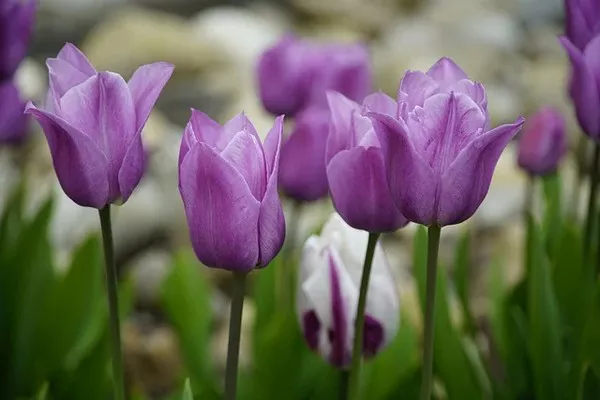In the vibrant world of flowers, each hue carries its own unique symbolism, reflecting cultural, historical, and personal significance. Among this colorful tapestry, purple flowers stand out for their enigmatic allure and rich symbolism. From representing royalty and spirituality to symbolizing mystery and admiration, the meanings attributed to purple blooms are as diverse as the flowers themselves. In this article, we delve into the symbolism of purple flowers, exploring their significance across cultures and contexts.
The Historical Significance of Purple
Before delving into the symbolism of purple flowers specifically, it’s essential to understand the historical significance of the color itself. Historically, purple has been associated with power, wealth, and royalty. In ancient times, obtaining purple dye was a laborious and expensive process, making it accessible only to the elite. In fact, the use of purple in clothing and regalia was often reserved for monarchs and high-ranking officials, symbolizing their elevated status within society.
The association of purple with royalty persisted through the ages, with monarchs such as Julius Caesar and Cleopatra embracing the color as a symbol of their authority. In Christian liturgy, purple is also associated with penance and mourning, adding layers of spiritual significance to its symbolism.
Purple Flowers: A Symbol of Royalty and Luxury
Given the historical association of purple with royalty and luxury, it’s no surprise that purple flowers often convey similar meanings. Purple blooms exude an air of elegance and sophistication, making them a popular choice for upscale events and formal occasions. From majestic orchids to delicate lavender, purple flowers add a touch of regal splendor to any floral arrangement.
One of the most iconic purple flowers, the violet, has long been associated with nobility and refinement. In Victorian England, violets were often exchanged between lovers as a symbol of faithfulness and devotion. Additionally, the purple iris, with its striking petals and distinctive shape, is often regarded as a symbol of wisdom and admiration.
Spirituality and Transformation
In addition to their association with royalty and luxury, purple flowers are also deeply intertwined with themes of spirituality and transformation. Across various cultures and belief systems, the color purple is often associated with higher consciousness, spiritual enlightenment, and the divine.
For example, in Hinduism, the purple lotus holds great significance as a symbol of spiritual awakening and enlightenment. Similarly, in Buddhism, the purple lotus is associated with the highest state of consciousness, representing the journey towards enlightenment and transcendence.
In Western spiritual traditions, purple flowers are often seen as a symbol of transformation and renewal. The delicate blooms of the purple hydrangea, for instance, are thought to embody the concept of change and growth, reminding us of the cyclical nature of life.
Expressing Admiration and Adoration
Beyond their associations with royalty and spirituality, purple flowers are also often used to express admiration, adoration, and respect. Whether presented as a token of friendship or a gesture of romantic love, purple blooms convey a sense of admiration and appreciation for the recipient.
The purple rose, in particular, has become synonymous with enchantment and admiration. While red roses are traditionally associated with romantic love, purple roses are often given to express admiration, gratitude, or fascination. Their rare and captivating beauty makes them a cherished symbol of affection and esteem.
Cultural Variations in Symbolism
While certain themes and meanings associated with purple flowers transcend cultural boundaries, there are also variations in symbolism across different cultures and traditions. For example, in Chinese culture, the purple orchid symbolizes fertility and abundance, making it a popular choice for wedding bouquets and decorations.
In Native American traditions, the purple coneflower holds significance as a symbol of strength and vitality. Used for both medicinal and ceremonial purposes, the purple coneflower is revered for its healing properties and spiritual significance.
Similarly, in Japanese culture, the purple chrysanthemum is associated with longevity and rejuvenation. Often featured in artwork and literature, the purple chrysanthemum symbolizes the beauty of life and the resilience of the human spirit.
Personal Meanings and Interpretations
While the symbolism of purple flowers is rich and varied, it’s essential to recognize that personal experiences and interpretations also play a significant role in assigning meaning to these blooms. For some individuals, purple flowers may evoke memories of a cherished loved one or serve as a reminder of a special moment in their lives.
Furthermore, the specific type of purple flower can influence its symbolism and significance. While some may associate lavender with tranquility and relaxation, others may see it as a symbol of femininity and grace. Similarly, the deep, velvety petals of the purple tulip may evoke feelings of passion and desire for some, while others may interpret them as a symbol of elegance and refinement.
In essence, the meaning of purple flowers is not fixed or immutable but rather fluid and subject to interpretation. As such, the symbolism of these blooms can vary greatly depending on the cultural context, personal associations, and individual perspectives.
Conclusion
In conclusion, purple flowers hold a wealth of symbolism and meaning that transcends cultural boundaries and spans across centuries. From their association with royalty and luxury to their symbolism of spirituality and transformation, purple blooms captivate the imagination and stir the soul.
Whether used to convey admiration, express love, or celebrate life’s milestones, purple flowers continue to enchant and inspire people around the world. As we navigate the complexities of the human experience, may we find solace and inspiration in the timeless beauty and symbolism of these exquisite blooms.


